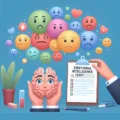Understanding Emotional Contagion
Emotional contagion refers to the phenomenon where people unconsciously ‘catch’ the emotions of those around them. When we are around people expressing negative emotions like stress, anxiety or sadness, we may start to feel those emotions too. The same happens with positive emotions – being around happy, optimistic people can lift our own mood.
How it Works
Emotional contagion is largely driven by unconscious mimicry and feedback processes. When we interact with emotional people, our brains cause us to mimic their facial expressions, vocalizations, postures and movements. This physical mimicry activates parts of our nervous system related to feeling emotions, causing us to converge emotionally.
Impacts on Wellbeing
Feeling emotions transferred from other people too strongly or too often can negatively impact mental health over time. However, shared positive emotions can also increase social bonding, cooperation and general wellbeing. Overall, emotional contagion demonstrates how interconnected we are as social beings – for better or worse.
Managing Emotional Contagion
Here are some tips for managing emotional contagion:
- Recognize when you are unconsciously ‘catching’ others’ emotions
- Politely excuse yourself from very emotional situations when needed
- Spend more time with positive, upbeat people
- Practice stress management and self-care
- Spread positive emotions yourself through kindness
The Upside
While emotional contagion can be disruptive at times, humans likely evolved this way to promote social cohesion and empathy. Shared positive emotions can also create wonderful collective experiences. Overall, emotional contagion demonstrates that we are all in this together.
FAQ
What is emotional contagion?
Emotional contagion refers to the unconscious transfer of emotions between people through mimicry and feedback processes in social interactions.
Is emotional contagion good or bad?
Emotional contagion can have both positive and negative impacts. Catching negative emotions from others can be stressful and harmful over time, while shared positive emotions enhance social bonding and wellbeing.
How do you stop emotional contagion?
You can manage emotional contagion by recognizing when it is occurring, politely removing yourself from very emotional interactions when needed, spending more time with positive people, practicing self-care, and spreading positive emotions yourself.
Why do we mimic other people’s emotions?
Humans likely evolved to unconsciously mimic the emotions of others in social interactions to promote understanding, bonding, cooperation and group cohesion.
Does emotional contagion spread online?
Yes, even just reading emotional content in newsfeeds or social media can lead to emotional contagion. But shared positive emotions also spread online, demonstrating how we can uplift each other even from afar.









